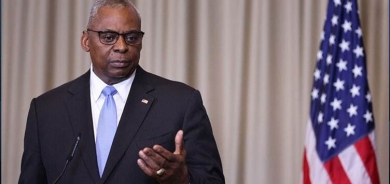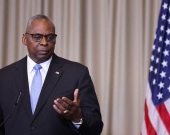Top Iraqi official traveling to U.S. to receive award, deliver lecture denied entry

The Los Angeles Times reported on Tuesday that a high-ranking Iraqi official who pulled the lever in the execution of former Iraqi leader, Saddam Hussein, was stranded and detained for 15 hours in Boston’s Logan International Airport alongside his adult son on February 20.
Mowaffak Rubaie, former national security advisor, who was heading to the U.S. to receive the Dr. Jean Mayer Global Citizenship Award from Tufts University and to lecture at the school on the future of U.S.-Iraqi relations, told the newspaper that he felt “degraded” at his detention during which he was not even allowed a bathroom visit or use a telephone.
Rubaie who was subjected to three pat-down searches, traveled to the U.S. on his British passport under the name Mo Baker which he has used many times to enter the country, but was denied entry after issues were raised by U.S. customs. He told the paper that showing his Iraq diplomatic passport which carries his real name also raised concerns.
While retired U.S. diplomat Daniel Serwar told the paper that U.S. rules make it exceedingly difficult even for people who are close friends to the country to enter, the Jordan-based Iraqi political analyst and commentator Ahmed al-Abyadh said that the scenario was meant to give a message to the Iraqi government that the United States has some doubts over its politics and its alliance with Iran.
“It is clear that the U.S. government does not feel comfortable with Iraq’s Shiite leaders,” Abyadh said, expecting that this “discomfort” to be on the increase.
Despite some confusion on whether Rubaie’s detention was due to security or political reasons, Abyadh said that “it could also be an attempt by the U.S. to clear old records with Iraq.”
Asked why Iraq and the United States did not emerge as close allies after more than a decade-long relationship that started with the toppling of Hussein’s regime, Abyadh said while both countries signed the Strategic Framework Agreement in 2008 in an attempt to further formulate and clarify the next phase for the two countries’ relations, the United States is still seeking an Iraqi “strongman” to activate and catapult the agreement.
Late last year, Iraqi Prime Minister Nouri al-Maliki said that his government was committed to renewing the signed agreement, dubbed as the second historical phase of relations between Iraq and United States. The agreement will be the basis of U.S.-Iraq relationship framework on which the U.S. will lend support to Iraqi ministries and agencies by boosting economic, diplomatic, and cultural and security plans to the country.
“Unfortunately America thinks Iraq needs a strongman to be in charge of Iraq … and this way of thinking should be gone,” he said, adding “Iraq needs a ‘smartman’.”
Abyadh said America thinks of Iraq’s problems as purely political. “The U.S. is still in search of a leader who has wide experience and expertise and is capable of activating and implementing the agreement. Finding the leader or the group of leaders who America believes in will enable relations with Iraq to move forward.”
No much of an uproar
News of Rubaie’s detention in a country considered to be a close-ally to Iraq did not create much waves.
Abyadh believes that Iraqi politicians are busy with the upcoming Arab Summit on March 29, the new crisis over the secular Sunni-backed Iraqiya List head, Ayad Allawi, opposing the summit, and talks of an assassination attempt against him.
However, an Iraqi columnist Ali Hussain wrote in the Iraq-based Al-Mada newspaper on Sunday that a certain segment of the Iraqi political elite expressed its annoyance at Rubaie’s detention.
Hussain who had his column circulated by other online news websites, continued: “We are in front of scary news, the man that highly served the Americans, has people in the White House denying him an entry … This is a bad omen for Rubaie, but this has many benefits for Iraqis; it has peeled off masks that used to cover the faces of many officials, especially those who cracked our heads with the theory of national security, foreign agendas and conspiracy targeting the newly budding democracy in Iraq.
“Opportunists think that they are smarter than everyone, or maybe because they do not read history, therefore do not benefit from experiences of nations, or it is their opportunism that has blinded their eyes.”
On Tuesday Rubaie was allowed to enter the U.S. without any incident for informal meetings at the State Department and the National Security Council.
Abyadh says according to his Iraqi and American sources, he was rumored to be in the U.S. to ask for protection to safeguard the upcoming Arab Summit.
(AFP)














